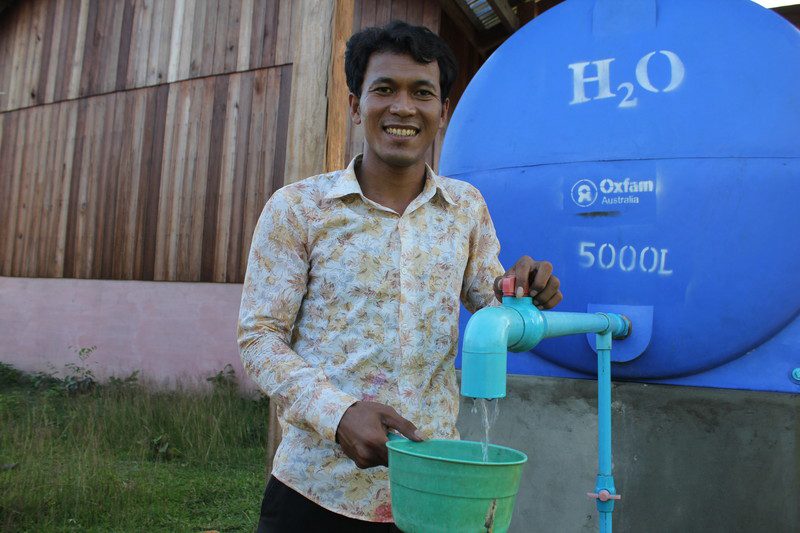Essential services: what we’re doing
To achieve this key goal by 2013, we support programs that:
- Support people to take part in health
- Provide essential services
- Build service providers’ knowledge and skills
- Develop holistic service delivery models
- Improve the health of Indigenous Australians
- Provide quality services following emergencies
- Increase access to HIV and AIDS treatment
- Advocate more and better quality aid
Our activities
Our work to ensure poor women and men have access to essential services has been multi-faceted in 2010–2011 — spanning service delivery work in countries where governments are unable or unwilling to provide these services; a brokering role between governments, communities and the private sector to provide or improve services; and advocacy to hold national governments to account to ensure their policies are targeting the needs of the poorest people.
Our Essential Services work has primarily focused on water, sanitation and hygiene (WASH), HIV and AIDS, indigenous health and campaign work and humanitarian response.
Some highlights from our essential services work in 2010–2011:
- We have made significant progress in developing an integrated water, sanitation and hygiene (WASH) program, with an AusAID-funded WASH Initiative being implemented in six countries — Zambia, Mozambique, Bangladesh, Cambodia, Timor-Leste and Papua New Guinea — with associated linking and learning events to foster sharing and growth. Through this program we have provided gender-sensitive water, sanitation and hygiene improvements to more than 100 remote rural communities
- In 20 villages in Bangladesh and 70 villages in Cambodia, the training of women’s WASH platform members in leadership, financial management, project planning and monitoring and evaluation targets the key retrievers of water. Through the broad goal of improved WASH services, women in Bangladesh and Cambodia are gaining negotiating skills and are empowered to advocate for services at a community level
- Gender has been a central plank of the Aboriginal and Torres Strait Islander people’s health programs we support. Gender-targeted activities include the men’s group, girls’ group, grandmothers’ group and women’s group in the South West Aboriginal Medical Service’s healing program, and health programs with men and boys in the Fitzroy Stars Football Club in Melbourne, Australia
- The Close the Gap campaign continues to earn bi-partisan and wide-spread community support. Since its launch in 2006, the campaign has been widely regarded as a best practice example of health equality campaigning. Results have included the bipartisan signing of a Statement of Intent, the commitment of a further $1.6 billion towards closing the gap on health outcomes for Aboriginal and Torres Strait Islander Peoples, raising public awareness of Indigenous health issues and gaining the commitment of the Federal Government to develop a national plan to achieve Aboriginal and Torres Strait Islander health equality within a generation
- In South Africa, the Oxfam HIV and AIDS program has successfully identified and supported those service delivery partners who are also actively engaged in advocacy. For example, one partner has brought together religious and traditional leaders and community and government representatives to highlight the difficulties in accessing services such as antiretroviral therapy and engage them in combating gender-based violence
- An evaluation of a youth-targeted sexual and reproductive health program that we support in Vanuatu found that the program uses effective approaches to target young people and this had led to an increase in the uptake of sexual and reproductive health information in the communities. Young people felt the program had resulted in behaviour change. The program design and delivery suggested our partner Wan Smolbag is appropriately identifying and filling a gap in health services
- Our brokering and facilitation role has helped to hold governments to account for the provision of essential services in Zambia and Indigenous Australia. We have successfully advocated for the funding of suicide prevention and healing programs for Aboriginal people in Western Australia. In Zambia, as a result our success in planning and implementing Community Led Total Sanitation (CLTS) activities, the Ministry of Local Government has adopted and is actively promoting CLTS as a strategy for the whole country
- Our submissions into the Inquiry into Australia’s Relationships with the Countries of Africa, highlighted concern over the proposal that the Australia-Africa Mining Industry group engage in public-private partnership to delivery social development. We suggested a model that includes non-government organisations (NGOs) collaborating with mining companies to improve development in host countries. The final report of this inquiry, released in June 2011, echoed our submission, stating: “The committee therefore sees value in DFAT (Department of Foreign Affairs and Trade) facilitating meetings between NGOs, resource companies and AusAID with a view to cooperating in development initiatives and maximising synergies”
Find out more
- Read about some of our learnings and progress on this goal
- Read the mid-term review analysis on our work on this goal
- Read an overview of our essential services goal
- Read case studies from the concise version of the annual report
